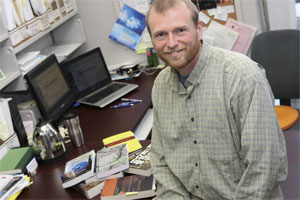 |
| Prof. Meinhard Doelle. (Nick Pearce Photo) |
From food security to environmental deterioration, societies around the world are wrestling with huge challenges. One thing is certain: the solutions will need to be as complex as the problems. To deal with environmental deterioration, one of the many methods at our disposal is the evolving field of environmental law.
Meinhard Doelle directs the Dalhousie Law School's Marine and Environmental Law Program (MELP) and is passionate about the potential that legal options bring to sustainability. Prof. Doelle says his field is just getting started and there are many improvements to be made, with the greatest challenge being implementation.
"There are lots of great ideas about how to address climate change, for example, but we haven't gotten to a point where there is the right combination of political will, public awareness, public pressure and public understanding of the issues to ensure that effective measures are being implemented," he says.
Education, awareness, economic instruments and economic measurements are just some of the other options that can be used. Prof. Doelle suggests that a combination of these approaches, including environmental law, is a great solution.
"My personal view is that when you have a challenge that is as great as the various environmental challenges that we're facing, you have to use all the tools in the toolbox. Law is one of those. In some circumstances, it may be the most effective. In other cases, there are other tools that will be more effective," says Prof. Doelle.
In future, he'd like to see the integration of legal tools with voluntary measures, economic and educational tools. Another improvement that can be made is looking at more effective ways of enforcing compliance of environmental laws.
Prof. Doelle is currently writing a book on environmental compliance, researching strategic and environmental assessments, and writing an environmental law textbook. He is also a panel member for the assessment of the Churchill Hydro-Electric Generation Project.
MELP faculty are involved in advising nongovernmental organizations, agencies of the UN, and government departments, as well as undertaking scholarly research and publications. MELP has been preparing law student for over 30 years, which is about the time that environmental law came into existence. Graduates have gone on to environmental lawyers, government personnel and directors of environment program such as the Sierra Club of Canada and the East Coast Environmental Law Association.
As the environment becomes an increasingly urgent issue, it will be interesting to see what direction aspects such as political will and public pressure will take. Will they ever combine enough to be effective?
As the future generation, it is up to us to make sure that they do.
